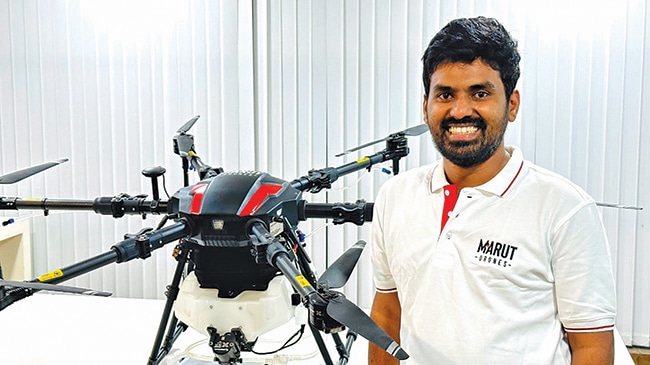Founded in Telangana in 2019 by CEO Prem Kumar Vislawath with co-founders Sai Kumar and Suraj Peddi, Marut Drones leverages drone technology to tackle agricultural challenges and promote sustainable farming across India.

All founders are from the 2008 cohort at IIT Guwahati. “After completing our bachelor’s degrees, we gained experience working in the corporate sector. In 2018, we came together with a shared vision to tackle challenges using drone technology, and by 2019, we officially established the company,” shares Prem.
The company operates through three core verticals. In drone manufacturing, it designs and builds drones, with over 600 units operating across India. The drone-as-a-service vertical offers customised drone-based solutions to government agencies, corporations, and individual farmers. The drone training division also provides DGCA-approved pilot training and licences, valid for 10 years. Over the past six years, the company has expanded its presence to 14 states, offering a diverse product range that includes spraying drones, surveillance drones, afforestation drones, and delivery drones, catering to the evolving needs of various sectors.
Marut Drones’ technology focuses on early detection of crop diseases and precision farming, enhancing farm productivity, promoting environmental sustainability, and boosting farmers’ incomes.
While explaining the meaning behind the company’s name, Prem highlights that the choice of Marut reflects a solid connection to Sanskrit, symbolising a vision of addressing challenges through inspiration drawn from ancient concepts. With Marut representing the ‘God of the Sky,’ the name aligns perfectly with this philosophy. Thus, embodying and representing the company’s mission was deemed an ideal choice.
The startup’s head office and manufacturing facilities are located in Hyderabad. While operations are centred in Hyderabad, the company also maintains smaller offices and employs 160 people. Its portfolio primarily targets agriculture, offering agricultural spraying drones, direct-seeding drones, and crop-monitoring drones for pest and disease detection.
Prem explains that 60% of the components are manufactured in-house, while the remaining 40% are sourced from suppliers in Hyderabad. The company also has dedicated assembly and testing facilities.
The startup claims to have several patents and has additional applications in progress. Among the granted patents are utility and design patents, including one for an innovative application: drone-based transplantation in agriculture, specifically for paddy fields. Traditionally, transplantation is done manually, but the company has automated the process using drones. While patents for this innovation have already been granted, the company is also applying for more, reflecting an ongoing focus on research and development.
The startup reports monthly sales of 100 to 150 units. Prem reveals that the company maintains an inventory of over 100 drones in production at any given time. Annually, they achieve total sales of around 1000 units.
Marut Drones’ AG365 is an advanced drone designed for year-round agricultural use, functioning as an aerial tractor with six key applications. It sprays liquids like insecticides, pesticides, and herbicides, distributes granular fertilisers, seeds, and attractants, and supports direct seeding for crops such as rice. Additionally, it aids in hybrid seed pollination, pest detection, and thermal fogging. With plug-and-play payloads, farmers can easily switch applications. The AG365 offers a rapid return on investment (ROI), enabling cost recovery within 6-7 months.
The startup specialises in drone sales, training, and drone-based services tailored for the agricultural sector, generating three primary revenue streams. Operating across 12 states, it serves regions with the highest demand, including Telangana, Andhra Pradesh, Tamil Nadu, Karnataka, Kerala, Madhya Pradesh, Uttar Pradesh, Bihar, Assam, and Maharashtra.
Training programmes are open to individuals with at least a 10th grade qualification and valid ID, such as a PAN card or passport. Sessions are conducted in regional languages like Hindi, Tamil, Telugu, Malayalam, Kannada, and Marathi to ensure accessibility. This initiative equips farmers and aspiring drone operators with critical skills for the modern agricultural sector.
The startup aims to expand partnerships with the owners of farm machinery and pesticide companies to promote their technology, and with dealers and distributors—such as village-level tractor dealerships—to showcase and sell drones to farmers and entrepreneurs. Prem explains that, along with strategic partnerships, the company is also exploring financial collaborations with banks, NBFCs, and other institutions to facilitate loans for drone purchases. Furthermore, the company aims to partner with agricultural universities, IITs, and colleges to set up training centres, to leverage their existing infrastructure on a profit-sharing model.
Operating in a nascent industry, the company faces challenges sourcing key components. Prem says they are actively seeking collaborations with Indian manufacturers to overcome these hurdles and accelerate the development and deployment of new applications.
Marut Drones, which achieved a revenue of 230 million INR last year, aims to surpass 500 million INR within the next two years and reach 1 billion INR over the following 2-3 years.








